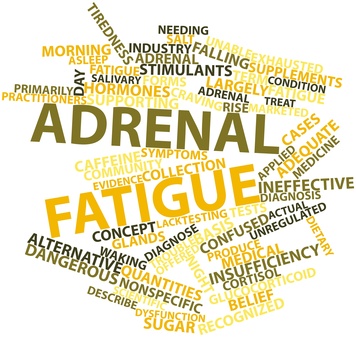Adrenal fatigue is when your adrenal glands are so overworked that they barely function anymore. Today’s stresses and strains can cause the average person to feel occasionally burnt out, but when you are consistently exhausted and overwrought it may be because of a more serious problem. The function of your adrenals is to enable you to react to stress. This can be everyday situations such as work, relationships, illness or difficult people. People suffering from hypoadrenia (adrenal fatigue) usually rely on caffeine and sugar for their main energy source. This results in hypoglycaemia (low blood sugar) which puts an increased strain on the adrenal glands. Eating little and often is very important to maintain sugar levels. It is vital to eat before 10am if you are suffering from this condition. After 8am your cortisol levels are at their peak and this can cause a decrease in your appetite, but try and eat something small even if you are not hungry, because you will feel better after eating. Eating lunch before 12pm and a snack between 2pm – 3pm is recommended. Having your dinner at about 5pm – 6pm and another snack before bedtime is advised to reduce anxiety, and help you to sleep.
People suffering from adrenal fatigue often crave salt and this is because their sodium levels are low. Sodium is an electrolyte which encourages the function of the hormone, aldosterone. It is important to consider how much water or liquid you drink, because if your beverage doesn’t contain sodium it could cause you to feel worse. It is inadvisable to consume drinks that are rich in potassium such as fruit juice, because this will disrupt your sodium/potassium ratio. You should drink a combination of water, sodium and potassium. Pouring kelp powder on your food is a good way of getting these nutrients because it contains both sodium and potassium. Try and avoid caffeine and alcohol because they cause dehydration, which will further disrupt your sodium levels.
Symptoms of adrenal fatigue
- Extreme fatigue even after getting 8 hours’ sleep
- Craving salt
- Lethargic
- Reduced libido
- Unable to cope with stress
- Jittery and nervous
- Poor immune system/ delay in recovering from illness or injury.
- Light headed/dizzy
- Depression
- Increased PMS
- Fluctuating blood sugar levels
- Poor concentration and inability to make decisions
- Memory loss and absentminded
- Decreased productivity for tasks
- Irregular heart beat
- Increased thirst
- Salt cravings
- Low blood pressure
Causes of adrenal fatigue
- Insomnia
- Increased caffeine and sugar intake
- Poor diet
- Perfectionism
- Staying up late and working late
- Not getting enough rest
- Alcoholism or drug dependency
- Financial pressure
- Emotional trauma/physical trauma
- Work problems
- Unhappy relationships
- Excessive exposure to chemicals
- Infections
- Dehydration
- Allergies
- Asthma
- Malnutrition
- Extreme temperature conditions
Vitamins and herbs that help adrenal fatigue
Vitamin C is vital to encourage the function of the adrenals. It is also well known for helping the immune system. Food sources which are high in vitamin C are oranges, peppers, tomatoes, green leafy vegetables and sprouts.
Vitamin E eliminates free radicals from the body. Adrenal hormones can cause free radicals to occur and this may cause harm inside the cells. Food sources containing vitamin E are almonds, hazelnuts, peanuts, wheatgerm oil, sunflower seeds, fortified cereals, spinach, kale, broccoli, mangoes, tomatoes and kiwi.
B vitamins – B complex contains all of the B vitamins and these are very important to help your adrenals to function properly. Food sources containing B vitamins are wholegrains, marmite, miso, rice bran syrup, oats, green vegetables, bell peppers, parsley, beetroot, lentils, meat, fish and eggs.
Magnesium is beneficial for the function of enzymes in the body. Food sources include brown rice, nuts, seeds, beans, kelp, green leafy vegetables, bananas, dark chocolate, dried fruit, avocados and yoghurt.
Calcium helps to calm your nervous system. Foods containing calcium are goats milk and cheese, dairy products, green leafy vegetables, green beans, bok choy, fortified tofu, seafood, legumes, sesame seeds, beans, kelp, and almonds.
Manganese, selenium, molybdenam, chromium, copper, zinc and iodine are trace minerals which help to relax you if you are feeling anxious and upset.
Licorice root is renowned for helping the adrenals to function effectively. It also reduces the side effects caused by hypoglycaemia and boosts energy levels.
Ginseng – Korean and Siberian ginseng help to restore your energy levels and support your adrenals.
Ginger root is an adaptogen which helps to regulate cortisol, blood pressure, increase energy levels and aids digestion.
Tips to help you to cope with adrenal fatigue
- Make sure that you get enough rest, try to get at least 8 hours sleep per night
- Go to bed before 10pm
- Avoid stimulants (caffeine, sugar, taurine and alcohol)
- Eat a well-balanced diet and take vitamin, mineral and herbal supplements
- Do relaxing exercise such as swimming or walking
- Listen to relaxing music or a guided meditation CD
- Adopt a healthier lifestyle
(N.B if you are taking medication or have another health condition apart from adrenal fatigue, it is recommended that you speak to your pharmacist or doctor before taking vitamins, minerals or herbal supplements.)
The Cortisol/DHEAS Saliva Test measures the levels of the stress hormones DHEAS and cortisol in your saliva. You can contact The Biological Testing Service Ireland on Tel: 091-79241 or email janette@btsireland.ie regarding screening for this.









